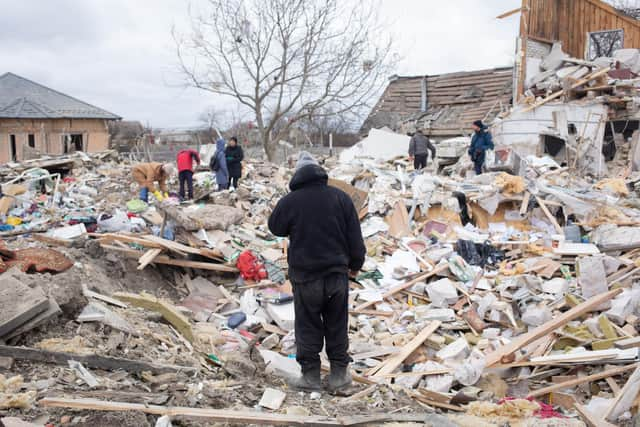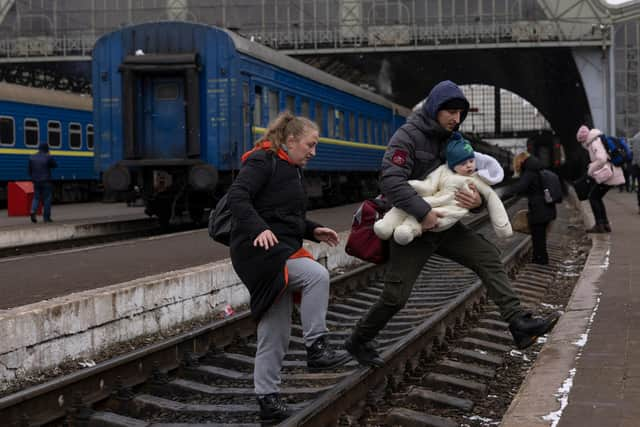Russia-Ukraine war: West must resist crisis fatigue and realise opposing Vladimir Putin requires long-term commitment – Alastair Stewart
The then Prime Minister Jim Callaghan's actual words were: “I don't think other people in the world would share the view there is mounting chaos.” The Sun paraphrased his remark in a damning headline that summed up his response to the “Winter of Discontent” and worsening relations with Russia.
In 2022, the reverse now seems to be the truth – after a while, the public becomes cognitively dissonant to emergencies and, very quickly, a crisis becomes the new normal. If that was not true before the Covid pandemic, it most definitely is now.
Advertisement
Hide AdAdvertisement
Hide AdThe public outrage over the Russian invasion of Ukraine has been humbling but not unexpected. Ordinary expressions of solidarity have been matched by fundraising campaigns, protests and demands for more government action to support refugees.
Day after day, the full attention of the world is on Ukraine. But how long can it last?
In the past ten years alone, recent “game-changing” incidents – wars, famines, massacres, and humanitarian disasters – have had their white-heat media moment. There is outrage, shock, tears, calls to do more, calls to do less, calls to get the government to respond, before that crisis is relegated by the next one and the cycle repeats.
That is not to say they were solved or concluded. The retreat from Afghanistan and the black hole of despair it left has not ended; it is just barely reported and seldom discussed now. Wars and crises in Sudan, Syria, Iraq, Belarus, Libya, Crimea, and catastrophes like the Australian wildfires and EU refugee crisis are half-remembered.
So what exactly is the tipping point between moral outrage and something becoming just another crisis?


Are some global problems too complex to have a solution, so we lose interest? Indeed, that has been a problem in the Middle East, the Balkans and the African continent for decades.
The same issue abounds at home. Health scandals, institutional failures, racism, misogyny, toppling statues, crippling poverty and partying politicians only have a limited water cooler lifespan. It all becomes background noise. All of it is a fireworks display of emotional outpouring that then slowly disappears from the mind.
What we might call mission fade is never really called out beyond angry Twitter rants.


Advertisement
Hide AdAdvertisement
Hide AdInstead, we unfairly dismiss attempts to keep the popular momentum going as virtue-signalling. Humanitarian relief from the Scottish and UK governments is necessary, a critical component of international aid.
Already it is being injected with soundbites and quarrels about how it relates to Scottish independence with suggestions Scotland can do more on its own or Ukraine is analogous to the Scottish experience with England.
In the 21st century, part of the human condition is the feeling that our collective attention span is collapsing.
There is a grey line between signalling your intent to do more or doing nothing because you know it will make no difference. It is cynical, but that is the modern, digital experience.
The tipping point is always the degree to which self-interest is affected. We concentrate more on bad news for longer when we understand how it will directly impact us.
Foreign wars tend to be an issue when taxes go up. On climate change, there have been plenty of flash-in-the-pan moments of outrage at significant events like the COP26 summit, but it is a hassle to give up meat, cut down on water usage, check every clothes label, and live more environmentally frugal lives.
I worry that if the Ukrainian crisis goes on for long, it will become the kind of humanitarian background noise that has been the fate of so many other international disasters. If we accept that, we will forget the danger we are all in.
What is crucial is government guidance on what works best for Ukraine. The memory of public mobilisation is fresh after Covid, and the Scottish and UK governments should use that to specify what ordinary people can formally do in a coordinated effort.
Advertisement
Hide AdAdvertisement
Hide AdHashtags and profile flag badges will only get us so far. The danger of not having some semblance of a strategy is that the West takes the media and moral pressure off Vladimir Putin.
Many are hailing “the return of the West” – our unifying, liberty-loving backbone has been found after a despot invaded an innocent people.
The questions of escalation will only intensify. We cannot back down from hard questions or be entirely distracted by difficulties at home, like an energy crisis, a cost-of-living emergency and the lingering after-effects of the Covid pandemic.
The only way to show Vladimir Putin that the West is serious is to buckle down for the long haul. All the best will in the world alone cannot defeat his tanks, and the Russian president is well aware of that. Waning public attention will lead to a waning political appetite for stern foreign action.
This is not to say that we generally become unfeeling to the sights of crying mothers and obliterated, war-torn homes. But after decades of crisis, invasions, and horrors, the end equation is always the same.
The German journalist and satirist Kurt Tucholsky, not Stalin as sometimes claimed, said: “The death of one man: this is a catastrophe. Hundreds of thousands of deaths: that is a statistic.”
Beyond all other considerations, we cannot allow that to happen; bad news fatigue is how Russia will win, and we will all lose.
A message from the Editor:
Thank you for reading this article. We're more reliant on your support than ever as the shift in consumer habits brought about by coronavirus impacts our advertisers.
If you haven't already, please consider supporting our trusted, fact-checked journalism by taking out a digital subscription.
Comments
Want to join the conversation? Please or to comment on this article.
